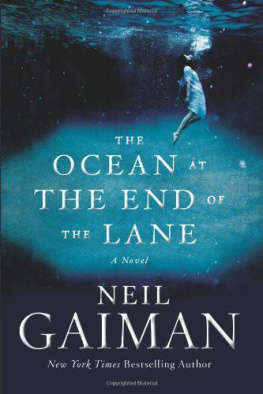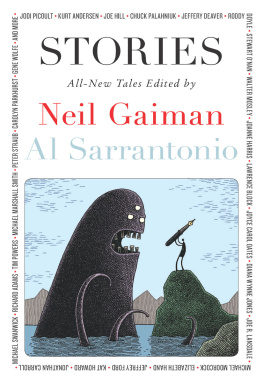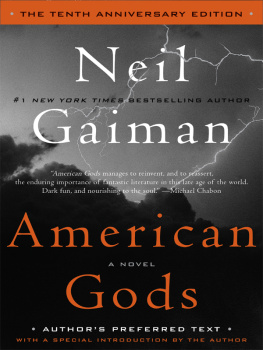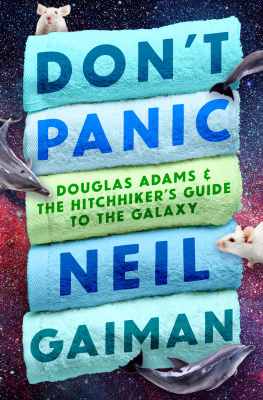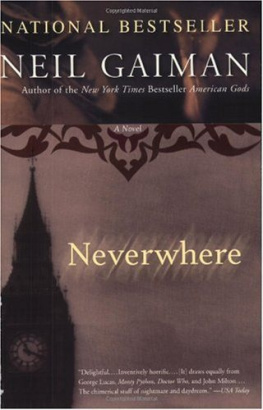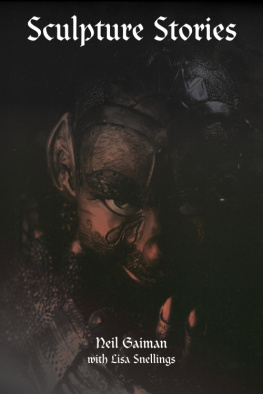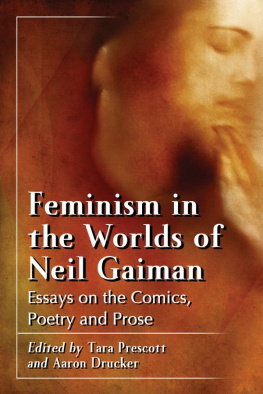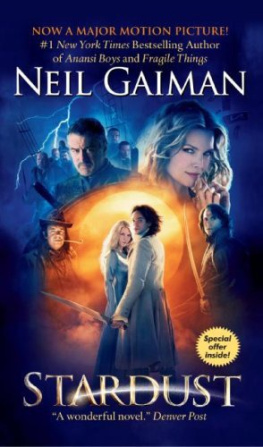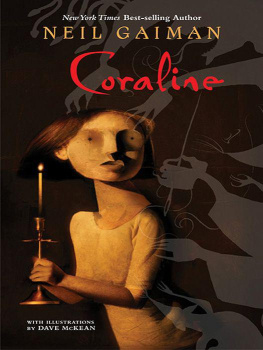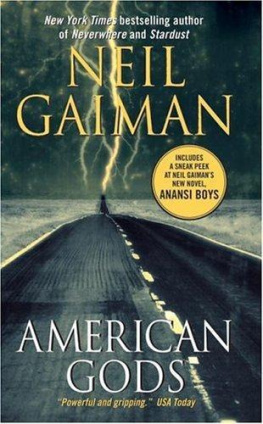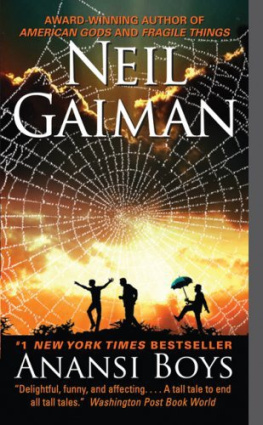Neil Gaiman - Anansi Boys
Here you can read online Neil Gaiman - Anansi Boys full text of the book (entire story) in english for free. Download pdf and epub, get meaning, cover and reviews about this ebook. year: 2005, publisher: HarperCollins, genre: Detective and thriller. Description of the work, (preface) as well as reviews are available. Best literature library LitArk.com created for fans of good reading and offers a wide selection of genres:
Romance novel
Science fiction
Adventure
Detective
Science
History
Home and family
Prose
Art
Politics
Computer
Non-fiction
Religion
Business
Children
Humor
Choose a favorite category and find really read worthwhile books. Enjoy immersion in the world of imagination, feel the emotions of the characters or learn something new for yourself, make an fascinating discovery.

- Book:Anansi Boys
- Author:
- Publisher:HarperCollins
- Genre:
- Year:2005
- Rating:5 / 5
- Favourites:Add to favourites
- Your mark:
- 100
- 1
- 2
- 3
- 4
- 5
Anansi Boys: summary, description and annotation
We offer to read an annotation, description, summary or preface (depends on what the author of the book "Anansi Boys" wrote himself). If you haven't found the necessary information about the book — write in the comments, we will try to find it.
Anansi Boys — read online for free the complete book (whole text) full work
Below is the text of the book, divided by pages. System saving the place of the last page read, allows you to conveniently read the book "Anansi Boys" online for free, without having to search again every time where you left off. Put a bookmark, and you can go to the page where you finished reading at any time.
Font size:
Interval:
Bookmark:

YOU KNOW HOW IT IS. YOU PICK UP A BOOK, flip to the dedication, and find that, once again, the author has dedicated a book to someone else and not to you.
Not this time.
Because we havent yet met/have only a glancing acquaintance/are just crazy about each other/ havent seen each other in much too long/are in some way related/will never meet, but will, I trust, despite that, always think fondly of each other.
This ones for you.
With you know what, and you probably know why.
NOTE: the author would like to take this opportunity to tip his hat respectfully to the ghosts of Zora Neale Hurston, Thorne Smith, P. G.Wodehouse, and Frederick Tex Avery.
CHAPTER
ONE
WHICH IS MOSTLY ABOUT NAMES AND FAMILY RELATIONSHIPS
CHAPTER
TWO
WHICH IS MOSTLY ABOUT THE THINGS THAT HAPPEN AFTER FUNERALS
CHAPTER
THREE
IN WHICH THERE IS A FAMILY REUNION
CHAPTER
FOUR
WHICH CONCLUDES WITH AN EVENING OF WINE, WOMEN AND SONG
CHAPTER
FIVE
IN WHICH WE EXAMINE THE MANY CONSEQUENCES OF THE MORNING AFTER
CHAPTER
SIX
IN WHICH FAT CHARLIE FAILS TO GET HOME, EVEN BY TAXI
CHAPTER
SEVEN
IN WHICH FAT CHARLIE GOES A LONG WAY
CHAPTER
EIGHT
IN WHICH A POT OF COFFEE COMES IN PARTICULARLY USEFUL
CHAPTER
NINE
IN WHICH FAT CHARLIE ANSWERS THE DOOR AND SPIDER ENCOUNTERS FLAMINGOS
CHAPTER
TEN
IN WHICH FAT CHARLIE SEES THE WORLD AND MAEVE LIVINGSTONE IS DISSATISFIED
CHAPTER
ELEVEN
IN WHICH ROSIE LEARNS TO SAY NO TO STRANGERS AND FAT CHARLIE ACQUIRES A LIME
CHAPTER
TWELVE
IN WHICH FAT CHARLIE DOES SEVERAL THINGS FOR THE FIRST TIME
CHAPTER
THIRTEEN
WHICH PROVES TO BE UNLUCKY FOR SOME
CHAPTER
FOURTEEN
WHICH COMES TO SEVERAL CONCLUSIONS
ONE
MOSTLY
ABOUT NAMES
AND
FAMILY
RELATIONSHIPS
IT BEGINS , AS MOST THINGS BEGIN, WITH A SONG.
In the beginning, after all, were the words, and they came with a tune. That was how the world was made, how the void was divided, how the lands and the stars and the dreams and the little gods and the animals, how all of them came into the world.
They were sung.
The great beasts were sung into existence, after the Singer had done with the planets and the hills and the trees and the oceans and the lesser beasts. The cliffs that bound existence were sung, and the hunting grounds, and the dark.
Songs remain. They last. The right song can turn an emperor into a laughingstock, can bring down dynasties. A song can last long after the events and the people in it are dust and dreams and gone. Thats the power of songs.
There are other things you can do with songs. They do not only make worlds or recreate existence. Fat Charlie Nancys father, for example, was simply using them to have what he hoped and expected would be a marvelous night out.
Before Fat Charlies father had come into the bar, the barman had been of the opinion that the whole karaoke evening was going to be an utter bust; but then the little old man had sashayed into the room, walked past the table of several blonde women with the fresh sunburns and smiles of tourists, who were sitting by the little makeshift stage in the corner. He had tipped his hat to them, for he wore a hat, a spotless green fedora, and lemon-yellow gloves, and then he walked over to their table. They giggled.
Are you enjoyin yourselves, ladies? he asked.
They continued to giggle and told him they were having a good time, thank you, and that they were here on vacation. He said to them, it gets better, just you wait.
He was older than they were, much, much older, but he was charm itself, like something from a bygone age when fine manners and courtly gestures were worth something. The barman relaxed. With someone like this in the bar, it was going to be a good evening.
There was karaoke. There was dancing. The old man got up to sing, on the makeshift stage, not once, that evening, but twice. He had a fine voice, and an excellent smile, and feet that twinkled when he danced. The first time he got up to sing, he sang Whats New Pussycat? The second time he got up to sing, he ruined Fat Charlies life.
FAT CHARLIE WAS ONLY EVER FAT FOR A HANDFUL OF YEARS, from shortly before the age of ten, which was when his mother announced to the world that if there was one thing she was over and done with (and if the gentleman in question had any argument with it he could just stick it you know where) it was her marriage to that elderly goat that she had made the unfortunate mistake of marrying and she would be leaving in the morning for somewhere a long way away and he had better not try to follow, to the age of fourteen, when Fat Charlie grew a bit and exercised a little more. He was not fat. Truth to tell, he was not really even chubby, simply slightly soft-looking around the edges. But the name Fat Charlie clung to him, like chewing gum to the sole of a tennis shoe. He would introduce himself as Charles or, in his early twenties, Chaz, or, in writing, as C. Nancy, but it was no use: the name would creep in, infiltrating the new part of his life just as cockroaches invade the cracks and the world behind the fridge in a new kitchen, and like it or notand he didnthe would be Fat Charlie again.
It was, he knew, irrationally, because his father had given him the nickname, and when his father gave things names, they stuck.
There was a dog who had lived in the house across the way, in the Florida street on which Fat Charlie had grown up. It was a chestnut-colored boxer, long-legged and pointy-eared with a face that looked like the beast had, as a puppy, run face-first into a wall. Its head was raised, its tail nub erect. It was, unmistakably, an aristocrat amongst canines. It had entered dog shows. It had rosettes for Best of Breed and for Best in Class and even one rosette marked Best in Show. This dog rejoiced in the name of Campbells Macinrory Arbuthnot the Seventh, and its owners, when they were feeling familiar, called it Kai. This lasted until the day that Fat Charlies father, sitting out on their dilapidated porch swing, sipping his beer, noticed the dog as it ambled back and forth across the neighbors yard, on a leash that ran from a palm tree to a fence post.
Hell of a goofy dog, said Fat Charlies father. Like that friend of Donald Ducks. Hey Goofy.
And what once had been Best in Show suddenly slipped and shifted. For Fat Charlie, it was as if he saw the dog through his fathers eyes, and darned if he wasnt a pretty goofy dog, all things considered. Almost rubbery.
It didnt take long for the name to spread up and down the street. Campbells Macinrory Arbuthnot the Sevenths owners struggled with it, but they might as well have stood their ground and argued with a hurricane. Total strangers would pat the once proud boxers head, and say, Hello, Goofy. Hows a boy? The dogs owners stopped entering him in dog shows soon after that. They didnt have the heart. Goofy-looking dog, said the judges.
Fat Charlies fathers names for things stuck. That was just how it was.
That was far from the worst thing about Fat Charlies father.
There had been, during the years that Fat Charlie was growing up, a number of candidates for the worst thing about his father: his roving eye and equally as adventurous fingers, at least according to the young ladies of the area, who would complain to Fat Charlies mother, and then there would be trouble; the little black cigarillos, which he called cheroots, which he smoked, the smell of which clung to everything he touched; his fondness for a peculiar shuffling form of tap dancing only ever fashionable, Fat Charlie suspected, for half an hour in Harlem in the 1920 s; his total and invincible ignorance about current world affairs, combined with his apparent conviction that sitcoms were half-hour-long insights into the lives and struggles of real people. These, individually, as far as Fat Charlie was concerned, were none of them the worst thing about Fat Charlies father, although each of them had contributed to the worst thing.
Font size:
Interval:
Bookmark:
Similar books «Anansi Boys»
Look at similar books to Anansi Boys. We have selected literature similar in name and meaning in the hope of providing readers with more options to find new, interesting, not yet read works.
Discussion, reviews of the book Anansi Boys and just readers' own opinions. Leave your comments, write what you think about the work, its meaning or the main characters. Specify what exactly you liked and what you didn't like, and why you think so.

